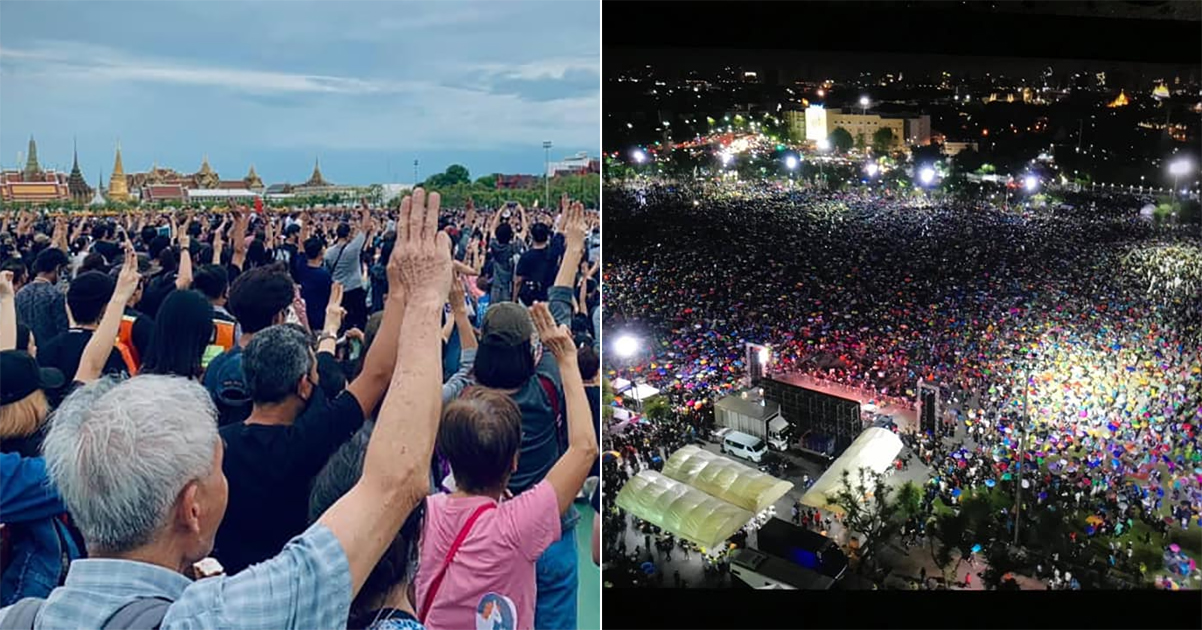Tens of thousands of people showed up en masse on Saturday, Sep. 19, 2020, in the Thai capital of Bangkok to protest against the current government and the role of the revered monarch.
Police said some 15,000 to 20,000 people showed up for the protests, while protest organisers say some 50,000 were present.
Social media posts claim 100,000 people showed up.
There were no reports of violence.More than 8,000 police officers showed up.
The Saturday rally that spilled over into Sunday was the largest since a military coup in 2014 ushered in yet another army-dominated government for Thailand.
Protests on the streets have been called for the resignation of Prime Minister Prayuth Chan-ocha, and the reform of the political system.
Prayuth won disputed elections in 2019.
Where was protests held?
The protests on Saturday moved from the campus of Thammasat University to a park next to a grand palace used for royal ceremonies.
The university did not give permission.
The vast space, Sanam Luang, is in front of the Grand Palace that used to be accessible to the public but was reclaimed for royal purposes in 2012 -- a sign that royal powers had expanded.
Demonstrators stayed overnight and promised to hand over a list of 10 demands to royal advisers on Sunday.
Why is this particular protest sensitive?
The calls for royal reform are particularly sensitive in Thailand.
Criticism of the monarch is punishable by 15 years in jail due to the strictest lese majeste laws in the world.
Publicly involving the monarch in political disputes is something new in Thailand and an inflammatory move.
How did this protest start?
A new wave of dissent kickstarted in February 2020.
This was after a court ordered, Future Forward Party, a pro-democracy opposition party to dissolve.
Particularly popular with the young, first-time voters, FFP garnered the third-largest share of parliamentary seats in the March 2019 election, which was won by the incumbent military leadership.
What other issues protesters addressed?
Protest speakers addressed multiple issues: The military’s monopoly on power, LGBTQ discrimination, social welfare, women’s rights, and the economic impact of Covid-19.
The lockdown rules of the pandemic has been accused of being used to stifle dissent.
Thailand is technically under pandemic lockdown, making protests illegal.
How have protests evolved in Thailand over the years?
The current protests are more about about restoring democratic values to a country once considered a relative bastion of political openness in the region.
This is unlike other street movements over the past 20 years, which were about warring political factions.
What has the protests achieved this time?
These latest protests has already pushed the government to agree to discuss changes to the constitution.
On Sunday, the protesters declared "victory", after they handed a list of 10 demands to officials.
Government fighting back
The government and its conservative supporters have denounced the students' other demands regarding the monarch.
Limits to be imposed on the spending, and on the political and military authority, of the king -- the monarch's status -- is considered controversial as the king is untouchable.
Thailand abolished its absolute monarchy in 1932 but the palace has retained considerable influence since then.
We deliver more stories to you on LinkedIn
Top photo via
If you like what you read, follow us on Facebook, Instagram, Twitter and Telegram to get the latest updates.
